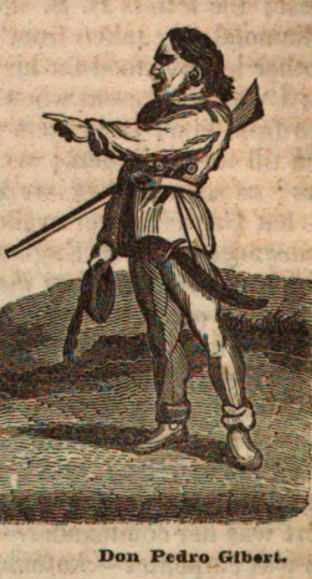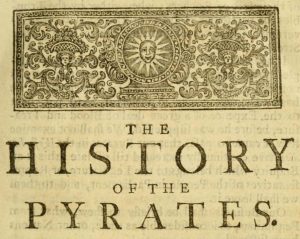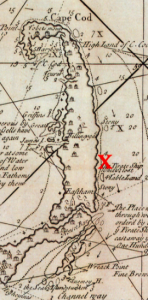![Execution of the Spanish Pirates. [Thursday, June 11, 1835.]](https://d4804za1f1gw.cloudfront.net/wp-content/uploads/sites/30/2020/06/headline.png)
For those living at the time, of course, it would not have seemed like the end of an era, but like just another episode in over two centuries of European and Euroamerican piracy on the East coast of the Americas. Learn about this trial and about the broader contexts of this striking and much-dramatized portion of our region's history with the BPL and open access resources below:
Don Pedro Gibert and the Panda
Pedro Gibert and his crew, aboard the schooner Panda, were accused of robbing the Salem ship Mexican and then attempting to incinerate it with its crew still onboard. Though the captain and four of his men were condemned and executed, they maintained their innocence to their graves.
- Discussion of and commentary upon the case, as well as somewhat lurid descriptions of the execution, can be read in the 19th Century US Newspapers database.
- Two publications nearly contemporary with the trial cover the case in greater and lesser detail, and both are freely available via HathiTrust:
- A report of the trial of Pedro Gibert [et al.], before the United States Circuit court, on an indictment charging them with the commission of an act of piracy, on board the brig Mexican, of Salem... : An exhaustive 80-page report on the trial.
- Trial of the twelve Spanish pirates of the Schooner Panda, a Guinea slaver... : A more concise 48-page account, with the added benefit of twenty exciting engravings like the ones reproduced at right and above.
- Decades later, a concise summary of the case was published in the 1898 Vol. XXXIV of the Essex Institute Historical Collections, freely available in digitized form through the Internet Archive.
Pirates in Boston and New England
Discover the doings and deeds of other pirates connected to Boston and the broader region with some of these other great BPL resources:
Ebooks
The Pirates of the New England Coast, 1630-1730
A classic history of the pirates of the region, formatted for eBook reading and available through Hoopla.
Focuses on piratical sundries relating to the great Rhode Island town; available through Hoopla.
Pirate Nests and the Rise of the British Empire, 1570-1740
Places Euroamerican piracy in a broader sociopolitical context. It reveals the unofficial and perhaps unintentional contributions of pirates to the expansion of the British imperial project, as well as the curious tendency of pirates to pop up in unexpected places. For example, Samuel Moseley, a Braintree native turned West Indies pirate, returned to Massachusetts and led a paramilitary force of child soldiers and pardoned pirates against the Wampanoag and other indigenous people during Metacom's War (also called King Philip's War) in 1675-76, and became infamous for his excess and cruelty. Available through Hoopla.
The interesting tale of how the Continental Congress authorized piracy in all but name against the British during the Revolutionary War, allowing for the accumulation of great sums of wealth through seafaring plunder. As the book's description notes, "Vast fortunes made through privateering survive to this day, among them those of the Peabodys, Cabots, and Lowells of Massachusetts, and the Derbys and Browns of Rhode Island." eAudiobook available through RBDigital.
Special Collections
Among the countless wonders in the Special Collections of the Boston Public Library is this 1724 copy of A General History of the Pyrates, attributed to Daniel Defoe and included in the Trent Collection of Defoe and Defoeana.
Though not necessarily about piracy in this region, it covers some of history's most famous pirates, including Mary Read, Anne Bonny, and Edward Teach (Blackbeard).
Primary Sources
 Read contemporary reports of other Boston pirate trials, like The arraignment, tryal, and condemnation, of Capt. John Quelch from 1704, in Eighteenth Century Collections Online.
Read contemporary reports of other Boston pirate trials, like The arraignment, tryal, and condemnation, of Capt. John Quelch from 1704, in Eighteenth Century Collections Online.
Sunken Treasure
One of the most notable pirate-related incidents in Massachusetts history is the 1717 sinking of the pirate ship (and former slave ship) Whydah off the coast of Cape Cod, which took with it both its captain, Samuel Bellamy, and over four tons of silver and gold. The story of this ship and the subsequent rediscovery of its wreckage are the subject of the resources below:
- The article "Pirates of the Whydah," from the May 1999 issue of National Geographic, accessible through National Geographic Virtual Library.
- The digitized book Real Pirates: The Untold Story of The Whydah From Slave Ship to Pirate Ship, published in 2007 by the National Geographic Society and also accessible through National Geographic Virtual Library.
- For a detailed look at the excavation of the shipwreck, take a look at this Artifact Inventory of items recovered from the wreckage, digitized from the BPL's Government Documents collection.






Add a comment to: Boston’s Last Pirates